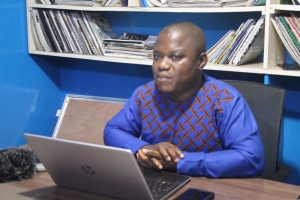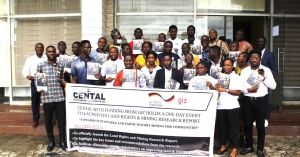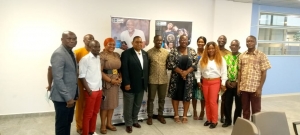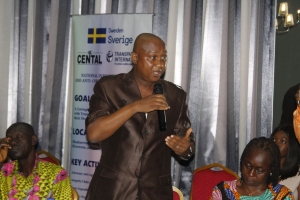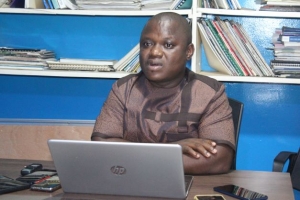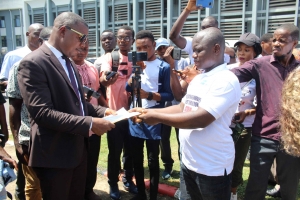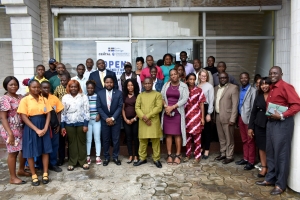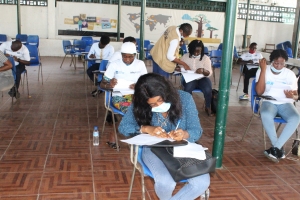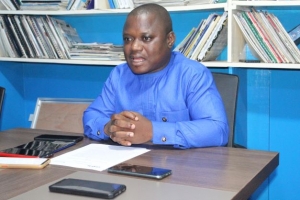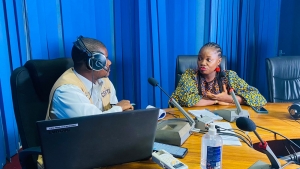Press Statement for Immediate Release
Press Statement for Immediate Release
Wednesday, August 10, 2022
‘Minister McGill’s Defense of Corruption Is Quite Revealing’, CENTAL Says
Distinguished ladies and gentlemen of the press, fellow Liberians, and development partners.
The attention of the Center for Transparency and Accountability in Liberia has been drawn to a video circulating
on social media, in which the Minister of State for Presidential Affairs, Mr. Nathaniel McGill is seen defending
acts of corruption. While on a political engagement at a well-attended meeting with citizens in Bong County, the
Minister justifies corrupt dealings of officials who steal public resources and invest same in Liberia. For him,
stealing from the people does not matter, once the money is not transferred abroad, but invested in the local
economy. According to him, these projects beautify local communities and are in the interest of the people
since they cannot be taken away, but remain grounded as tangible development.
CENTAL views these utterances of the Minister as being extremely troubling, given his position of influence in
the Liberian Government and that what he says or does could shape the decisions of many persons in society,
especially those he supervises or manages in government. That a person so close to the Office of the Liberian
The presidency will make such comments is extremely worrisome, in the wake of increasing allegations of
corruption against the CDC-led government officials and limited actions from the Presidency (the office Minister
McGill manages) to act against those concerned. Given his proximity to President George Manneh Weah, could
he be giving the official position of the Liberian Presidency on how it views corruption, something that might be
responsible for the very limited actions of the President against his officials accused and investigated for
corruption? Indeed, Minister McGill’s defense of corruption is quite revealing.
We are deeply concerned and disappointed, especially that these statements from the Minister are coming at
a time when the Power of the Liberia Anti-Corruption Commission to freeze the assets of individuals being
investigated and prosecuted for acts of Corruption has been removed in the amended and restated new LACC
Law, in violation of Article 31 of the United Nations Convention Against Corruption (UNCAC), which requires
States Parties to institute laws to freeze illicitly/illegally obtained assets/wealth. Also, it is coming at a time when
many questions linger about the questionable spending and donation spree of the Minister, which has seen
him making multiple donations in different parts of the country since he was appointed to manage the office
and activities of the Liberian Presidency. Additionally, these comments are coming at a time when it is reported
that majority of public officials are yet re-declare their assets, incomes, and liabilities three years after doing so
in 2018,
in line with the 2014 Code of Conduct for Public Officials.
Such anti-accountability comments have the ability to further undermine citizens' and development partners'
confidence in the Liberian Government, which may have implications for their budgetary and other support to
the country. We like to remind the Minister that there is and should be no place for Corruption in Liberia.
Corruption is forbidden in Liberia and around the world and there is no justification, whatsoever, for
perpetrating it. His comments grossly undermine the government’s stance and fight against corruption and reveal
why President Weah and his government have shown limited willpower to decisively and impartially address it.
Center for Transparency and Accountability in Liberia National Chapter
Tubman Boulevard, Opposite JFK Memorial Hospital, Monrovia, Liberia – Cell: +231-776391481
www.cental.org.lr
22 nd Street and Tubman Boulevard, Sinkor, Monrovia, Liberia
Cell: +231-886818855 – Email: This email address is being protected from spambots. You need JavaScript enabled to view it. - websites: www.cental.org.lr - www.liberiacorruptionwatch.org
Liberians and development partners whose taxes and financial and non-financial contributions are integral parts
of public resources and assets being referenced by the Minister will be deeply concerned and further
apprehensive about the proper utilization of their resources, which are not meant to be corrupted by public officials
in the name of investing same in the country. Public resources are meant to be used for the intended purposes
and fully audited and accounted for by the requisite state institutions and not otherwise.
In conclusion, we call on well-meaning Liberians, including the President, to join CENTAL in condemning the
statement made by the Minister. Additionally, we encourage all citizens to criticize and reject such
manipulations and mind-corrupting utterances intended to sway public officials and the larger public in a
direction which can only keep Liberia in the throes of poverty, underdevelopment, and injustice.
Signed: ______________________
CENTAL launches Land Rights and Mining Report.
NIF Commences Posting of Fees & Process-maps at NASSCORP
NIF Dialogues with Liberian Business Community
Press Statement for Immediate Release
Press Statement for Immediate Release
Friday, June 24, 2022
CENTAL Wants Timely and Concrete Actions Taken Against Those Investigated for Corruption
Distinguished ladies and gentlemen of the Press, fellow Liberians.
We like to thank the Liberia Anti-Corruption Commission (LACC), Financial Intelligence Unit (FIU), Liberia Extractives Industries Transparency Initiative (LEITI) and other public integrity institutions that are working under difficult conditions, including but not limited extremely limited budget and logistics from national government. Also, CENTAL welcomes LACC’s latest investigative reports covering different corruption scandals and incidences, largely involving high-ranking officials of the Weah-led Government. We are equally grateful to development partners who continue to stand by Liberia and Liberians by providing financial and nonfinancial resources to support key programs and interventions, generally geared at improving the quality of lives of the people.
Fellow Liberians, the state and quality of governance in Liberia continues to decline due to the failure of the most critical players to engender necessary reforms that will make Liberia a transformed, developed, more livable, and prosperous society for all. The Liberian Presidency appears indifferent, from all indications, to foster a genuine and committed fight against corruption—one that gives public integrity institutions the required leverage and push to operate at full capacity, decisively identify and deal with corruption and other related cases, help the President and the government of Liberia and Liberians to succeed at winning the war against corruption, as well as engendering a culture of integrity and zero tolerance for corruption.
Fellow Liberians, the media, and development partners, scandals continue to be reported in government involving key and strategically placed public officials. Sadly, the actions needed to prevent and arrest the situation and bring the perpetrators to book have not been full and complete, especially from the end of the Presidency. On 22 June 2022, President Weah appeared on a local radio station and intimated to the Liberian public that adhering to the democratic process and human rights norms means that provisional administrative sanctions cannot be taken against officials investigated by the Liberia Anti-Corruption Commission (LACC) and forwarded to the Ministry of Justice for prosecution. The investigations involved corruption scandals at the Liberia Institute for Statistics and Geo-Information Services, Ministry of Agriculture, Liberia Water and Sewer Corporation, among others.
Ladies and gentlemen of the Press, we remind the President of actions taken to suspend Ma-Tenneh L. Keita, Coordinator of Presidential Special Projects at the Ministry of States for Presidential Affairs, and Duannah Siryon, Tugbe C. Tugbe, and Isaac Roberts of the National Housing Authority (NHA), while they were undergoing investigation respectively. These were not a violation of their rights, but a demonstration of will in ensuring that corruption-related investigations and prosecutions receive the attention they deserve. Rather than having public officials facing such processes and at the same time be required to perform their official duties, allowing them their ‘day in court’ is important if the ends of justice must be met. Thus, were the President to insist on taking no actions on those investigated until the outcome of a court trial, such would be a huge blow to anti-corruption efforts.
Distinguished ladies and gentlemen of the Press, inaction by the President makes us wonder as to which side he really stands: whether with the majority of the Liberian People and ordinary citizens or some of his officials who have proven to be embarrassment to the country, his government, and the overall growth and development of the country? Where does the President truly stand on corruption, after much talks and rhetoric about being committed to the fight? CENTAL is deeply disappointed in the Presidency’s attitude towards the fight against corruption in Liberia as his inaction is inconsistent with continuous verbal commitment to deal with the vice in the country. It has been more words from the President than concrete actions to support public integrity institutions morally, financially, and logistically to play their respective roles. Also, it has been words in terms of the presidency having concrete and genuine discussions with integrity institutions to identify and make genuine attempts at addressing their logistical, staffing, and other needs to give his government the necessary reputation to engage with partners and mobilize resources from traditional and non-traditional sources to fund key interventions in the country.
In conclusion, we call on the President Weah to suspend all officials implicated in recent investigative reports released by the Liberia Anti-Corruption Commission. He cannot continue to love his officials more than vast majority of the Liberian People, as his stance against corruption has been extremely weak and disappointing. Also, we call on the President to provide the necessary moral, financial, and logistical support to public integrity institutions to enable them operate at full capacity, as they have critical roles in giving his government and Liberia the necessary reputation and standing to, among other things mobilize resources from traditional and non-traditional partners to address critical development needs of the country. Finally, we call on the media, civil society, and ordinary citizens to remain vocal and unrelenting in highlighting societal ills and demanding accountability of their leaders, while also denouncing corruption themselves. The new Liberia we collectively seek will not arrive in the midst of rampant corruption and other forms of bad governance.
Thank you.
Signed:
Management
Petition Statement to Members of the 54th National Legislature
Petition Statement to Members of the 54th National Legislature
Presented by the Joint Civil Society Anti-Corruption Initiative (JOCSAI), in collaboration with the Center for Transparency and Accountability in Liberia (CENTAL)
Monrovia, Tuesday, May 31, 2022
Whereas Corruption, defined by Transparency International as the abuse of entrusted power and authority for private gain, is pervasive in Liberia and believed to be one of the major causes of the Country’s gross underdevelopment and poverty-stricken conditions of its citizens, despite being naturally endowed;
Whereas, the Government of Liberia, supported by international partners, citizens, and other stakeholders has established key anti-graft institutions and passed Code of Conduct for Public Officials, Freedom of Information, and other laws; signed up to key international anti-corruption frameworks such as United Nations Convention Against Corruption and African Union Convention on Preventing and Combating Corruption as well as developed the Pro-Poor Agenda for Prosperity and Development (PAPD), particularly Pillar 4 on Governance and Transparency to fight against Corruption in Liberia;
Whereas, the fight against corruption in Liberia is challenged and undermined by several factors, including but not limited to low budgetary and logistical support to public integrity institutions, weak enforcement of anti-corruption laws and policies, the absence and limitation of key laws and institutions for dealing with corruption in Liberia, and limited political will to decisively act against public officials and other individuals at the center of grave incidences/allegations of corruption;
Whereas, fighting against Corruption requires a multi-dimensional approach encompassing prevention, prosecution, and partnership that combine different elements to curb the menace of corruption that has plagued the country for so long;
Whereas, the year 2021 saw robust anti-corruption initiatives aimed at increasing meaningful public participation in the fight against corruption through efforts focused on educating and creating awareness amongst the public about corruption, including the values reflected in desisting from it, and the importance of reporting it and living with integrity;
Whereas, it is generally recognized that the full disclosure of corruption and other criminal conduct is essential for the comprehensive investigation and prosecution of corruption and other criminal conducts in public institutions private organizations, and other spheres of society;
Whereas, the existence of strong laws that protect both persons who have the courage to become whistleblowers and witnesses in fully disclosing to investigators and prosecutors the perpetration and criminal conduct is the most appropriate and effective way to combat corruption and other criminal conduct and unethical practices in public institutions, private organizations, within communities and the larger society;
Whereas, measures taken for the protection of whistleblowers and witnesses of corruption and other related complaints and cases should be sufficient to create an atmosphere free of intimidation and any fear of physical injury or any other fear of harm;
Whereas, the need for the establishment of a Witness Protection Unit (WPU) as an autonomous agency in the Executive branch of Government to administer witness protection programs in collaboration with the Ministry of Justice (MOJ), Liberia Anti-Corruption Commission (LACC), and other related institutions cannot be overly emphasized;
Whereas, the need for the removal of the statute of limitation on corruption and financial crimes related offenses, and to amend and revise section 4.3 of the Criminal Procedure Law of Liberia remains very vital to the fight against corruption in Liberia;
Whereas, the need to amend certain provisions of part X, Section 10.1 of the Code of Conduct of 2014, also known as the Code of Conduct, to grant full authority to the Liberia Anti-Corruption Commission (LACC) to compile, verify, maintain and update a comprehensive Asset Declaration Register for all Government employees is equally vital;
Whereas, amending title 17 of the Revised Code of Law of Liberia, also known as the Judicial Law of 1972, by adding Chapter 26 establishing Criminal Court ‘F’ of the First Judicial Circuit, Montserrado County, and Special Divisions of the Circuit Courts of the other Counties of the Republic to have exclusive original jurisdiction over the crime of Corruption, including but not limited to, bribery, embezzlement, extortion, fraud, influence peddling, insider trading, misuse of entrusted public property and vested authority, money laundering, unjust enrichment, and any economic and financial crimes, is of key importance;
Now, therefore, in view of the above concerns, observations and efforts relative to the fight against corruption and to ensure that the necessary and proper mechanisms are in place to successfully tackle this callous vice in corruption, we the undersigned Civil Society and Community Based Organizations under banner, the Joint Civil Society Anti-Corruption Initiative (JOCSAI), a conglomerate of more than eight different CSOs and CBOs, having come together to facilitate and accelerate anti-corruption initiatives under the auspices of the National Integrity Building Anti-corruption (NIBA) Program with sponsorship from the Swedish International Development Cooperation (SIDA) through the Center for Transparency and Accountability in Liberia (CENTAL), petition you, the 54th National Legislature to increase budgetary support/allocation to the Liberia Anti-Corruption Commission (LACC), General Auditing Commission (GAC), Public Procurement and Concession Commission (PPCC), Liberia Extractives Industries Transparency Initiative (LEITI) and other public integrity institutions to enable them to function properly and at full capacity; timely act on audit reports submitted by the General Auditing Commission; and lead by example by welcoming and facilitating a financial audit of the Legislature covering the last unaudited years. Most importantly also, we Petition you for the unequivocal and speedy passage into law of the following Anti-corruption Instruments before you:
a. Bill to establish a special court to try all corruption-related cases;
b. Bill to revise the criminal procedure law thereby removing the statute of limitations from cases related to corruption;
c. Bill to amend section 10.1 of the Code of Conduct for Public Officials;
d. The draft revised act of 2008-Bill to give LACC the power to directly prosecute;
e. The Whistleblower Act- Disclosure and Protection; and
f. Bill to establish a Witness Protection Agency (WPA).
We respectfully submit and look forward to your fullest cooperation as a matter of urgency as the bills, which passage we seek are crucial to the effectiveness of the fight against corruption and bad governance in Liberia. We also urge you to ensure that the bills are not watered down in any form and manner, thereby losing their essence. Rather, any contemplated change (s) should be made by and through meaningful consultation with relevant civil society organizations and other stakeholders and must serve to strengthen the bills instead of detracting from them. JOCSAI holds the belief and takes resolve from the fact that when the fight against corruption is buttressed by the effectiveness in the application of the laws that are appropriately applied, victory in this struggle is certain, and the welfare of the governed is prioritized while public resources previously susceptible to fraud, waste and abuse are managed in accordance with appropriate legislations.
Done under our signature this 31st day of May, A.D. 2022.
CENTAL Ends Stakeholders’ Dialogue on CSDF
CENTAL Empowers Over 135 Students Through IClub
Press Statement for Immediate Release
Press Statement for Immediate Release
Thursday, May 12, 2022
Maintain the Integrity and Sanctity of the Liberian Passport: CENTAL Cautions the Weah Administration
Distinguished ladies and gentlemen of the Press, fellow Liberians.
On Monday, May 9, 2022, Liberians awoke to another disturbing news about apparent misdeeds in government, especially at the Ministry of Foreign Affairs. Like the 2020 Andrew Wonploe passport scandal related to the sale of Liberian Passports to non-Liberians, for which he was designated by the United States Government for undermining the rule of law and compromising the integrity and security of immigration processes, another grave report has emerged about Liberia’s diplomatic passport being in a wrong and undeserving hand. Frontpage Africa reported, quoting American Court sources, that Liberian businessman, Sheik Bassirou Kante, is undergoing trial in the U.S for money laundering conspiracy and was denied bail over several concerns, including possession of a Liberian diplomatic passport and his ‘deep personal relationship’ with the Vice President of the Republic of Liberia, Madam Jewel Howard Taylor. According to the report, Mr. Kante, alias Royal Gold, who is being tried for wire fraud amounting to US$ 7 Million, admitted to occupying no formal diplomatic position in the Liberian Government.
The Center for Transparency and Accountability is deeply concerned about the unceasing trends of these incidents, especially this latest passport scandal, which adds to multiple similar cases reported about the continuous sale of Liberian Passports (ordinary, official, and diplomatic) to undeserving and unscrupulous individuals for probable dubious business dealings and other clandestine purposes, including but not limited to corruption, money laundering, drug trafficking, and human trafficking. Like the Andrew Wonploe saga of 2020, Danish Journalist saga of 2012, and other scandals previously uncovered, this undermines the rule of law, national security, and the integrity and sanctity of our passport granting process. Additionally, it exposes the vulnerability of our systems and processes and devalues our priceless Liberian identity. It is extremely painful that while ordinary citizens queue during early hours and for several days to get passports, to which they are entitled, others have found it rewarding to deny their own citizens in favor of a passport black market. Such disgraceful acts have the tendency to place Liberia as a pariah in the comity of nations, since they have the propensity to undermine international peace and security.
CENTAL is very disappointed that the unorthodox dealings of public officials and their accomplices have become common place in Liberia, as government officials and their collaborators orchestrate plans to defraud the country and fatten their own pockets, at the expense of ordinary Liberians and voters who continue to be grossly mistreated by their leaders. Liberia is not for sale, and we caution the Weah administration to desist from despicable acts that rob Liberians of their heritage because of a few pieces of silver. The latest passport scandal speaks to many things. Among others, it shows:
- Gross vulnerability of the system and process for awarding passports (ordinary, official, and diplomatic);
- Limited political will and the culture of impunity for corruption and other related offenses, especially those perpetrated by high-ranking public officials;
- That often sugar-coated and cosmetic reaction from the national government, whenever major scandals are reported, has done very little to deter those involved and others harboring/having similar ambitions;
- The level of commitment required from the Presidency and Legislature to thoroughly and independently investigate these matters as well as fully support institutions statutorily mandated to do are very limited.
- Weak leadership and oversight of the Legislature, as it fails to effectively and independently oversee the work of the executive, the ministry of foreign affairs, and the passport granting process in this instant case;
- Undue influence and involvement of the politically connected in the passport granting process, especially higher-ups in government and their cronies and confidantes; and
- Weak internal oversight and scrutiny mechanisms and processes leave many things unchecked and vulnerable to manipulation and abuse by people lacking the integrity to serve in public service.
We wish to thank the President of the Republic of Liberia, His Excellency George Manneh Weah for launching an investigation into the matter. While the move by the President to instantly probe into the matter is welcoming, we strongly believe that the Ministry of Foreign Affairs is conflicted and cannot be trusted to independently and robustly interrogate said scandal. As the granting of passports to undeserving individuals has been lingering for many years, an investigation that will lead to concrete and lasting solution (s) cannot be left to the very entity and officials presiding over the process. From all indications, the latest development is a symptom of a long-standing problem, which could be traced to the very officials requested by the President to probe into the matter. For a credible process that ensures the confidence of the public and development partners, the President of Liberia should constitute an independent committee comprising of credible and reputable individuals from the religious community, civil society, the Press as well as the Liberia Anti-Corruption Commission to thoroughly oversee the matter.
As this matter is tied to the integrity and sanctity of the country, it cannot and should be treated lightly and subjected to the same “business as usual” approach to dealing with delicate matters in the country.
CENTAL wish to remind President Weah and his Government about earlier and repeated commitments made to fight against Corruption and promote good governance, as emphasized in the Pro-Poor Agenda for Prosperity and Development. Such commitment cannot and should not be a matter of lip-service and the usual rhetoric that have characterized successive governments in Liberia. Rather, it should be about genuine and demonstrated desire and commitment to pursue a sincere and an impartial fight against corruption. This is the surest way Liberia can be prosperous, economically viable, and strategically positioned to lift its citizens out of poverty and provide basic social services that are decentralized, inclusive, adequate, gender sensitive, and of the required quality.
In conclusion, we call on our development partners to be more vigilant and unwavering in standing by the Liberian People by exposing individuals who continue to collude to defraud the Country and keep ordinary Liberians trapped in poverty-stricken conditions. More and more sanctions for corrupt and unscrupulous individuals and officials of government are what we need as a strong deterrent tool for the increasing level of corruption and bad governance in the country. Also, we call on the media, civil society, and ordinary citizens to remain vocal and unrelenting in highlighting societal ills and demanding accountability of their leaders, while also denouncing corruption themselves. The new Liberia we collectively seek will not arrive in the midst of rampant corruption and other forms of bad governance.
Thank you.
Signed:
Management
CSOs Express Concern Over IMF’s $350 Millon Covid-Related Funds…Accuse Government of Being Tightlipped
CSOs Express Concern Over IMF’s $350 Millon Covid-Related Funds
…Accuse Government of Being Tightlipped
A local civil society organization, Public Health Initiative Liberia (PHIL) says the whereabouts of an International Monetary Fund (IMF) $350 million allocation to Liberia intended to, among other things: boost the Central Bank of Liberia (CBL) reserves; support economic growth and fight Covid 19 though vaccines remains in limbo.
PHIL’s Executive Director, Joyce L. Kilikpo said PHIL, along with other CSOs have been exerting efforts to demand for accountability on the prudent utilization of the IMF’s Special Drawing Rights (SDR) that was allotted to Liberia, but to no avail.
Speaking Thursday, May 5, 2022, on CENTAL’s Integrity Watch Radio Program aired on ECOWAS Radio 91.5 FM and relayed on Prime 105.5 FM, Madam Kilikpo said it is frustrating that key government institutions concerned, including the Ministry of Finance and Development Planning (MFDP), the Central Bank of Liberia (CBL) have vehemently refused to provide any information on the whereabouts of the fund.
“It’s so sad and very frustrating that a Government that should be accountable to the people would refuse to provide information on money that was intended to help the country and its people. The lack of information, or access to information, especially under this administration is seriously hampering our work as CSOs,” said Madam Kilikpo.
According to the PHIL boss, of all the institutions/organizations written/engaged since February this year on the whereabouts of the US$350 million, only the Ministry of Health and IMF have so far responded to their inquiries. Both Ministry of Health and IMF have expressed concerns over the fund. The IMF has called for openness in all processes regarding this and other funds for Liberia.
“The MFDP and CBL are yet to give us audience since we wrote them in February requesting to have a meeting with them on the matter,” she stated.
The SDR is an international reserve asset, created by the IMF in 1969 to supplement its member countries' official reserves. To date, a total of SDR 660.7 billion (equivalent to about US$943 billion) have been allocated. A country's IMF quota, the maximum amount of financial resources that it is obligated to contribute to the fund, determines its allotment of SDRs.
However, Madam Kilikpo stated that credible information received indicate that the Government of Liberia unilaterally redirected the funds to infrastructure development without the knowledge and consent of its partners/stakeholders.
“Even though this information is yet to be verified, but the refusal of these two key institutions to give us audience speaks to the lack of transparency and accountability on the SDR allocated to Liberia,” the PHIL boss said. Meanwhile, the Public Health Initiative Liberia Executive Director has called for a joint advocacy effort by CSOs in the country on the matter.
In 2019, nine (9) foreign diplomats, including the head of the European Delegation to Liberia and ambassadors of the United States of America, France, Germany, Ireland, Japan, Norway, Sweden and the United Kingdom of Great Britain and Northern Ireland warned the Government of Liberia against redirection of their monies at the CBL.
The diplomats accused the Government of irregular withdrawals of their project monies from the Central Bank of Liberia (CBL) for use outside of the intended purposes.
The Integrity Watch Radio Program is a key advocacy tool of CENTAL that provides essential information around the state of the fight against corruption and national integrity building efforts as well as promotes the culture of accountability, transparency, integrity and evidence-based decision-making across all sectors and institutions in the country. Aired Wednesday and Thursday on Truth FM and ECOWAS Radio, the Program serves as an advocacy, coordination and engagement platform to rally citizens and other stakeholders’ support for the fight against corruption and bad governance in Liberia.
With support from the Government of Sweden through SIDA, it is an activity under CENTAL’s ongoing National Integrity Building and Anti-Corruption (NIBA) Program.
-30-
LOCATION
22nd Street, Sinkor
Tubman Boulevard
Monrovia, Liberia
Phone: +231 88 681 8855
Email: info@cental.org.lr
Website: www.cental.org.lr
SUBSCRIBE
Get updates and important events straight to your inbox. We don't spam

